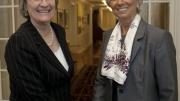The Harvard Kennedy School (HKS) class of 2012 numbers almost 600 students, representing 81 countries, and many of its members appeared, along with family and friends, at the big tent in JFK Park on Wednesday afternoon to hear Christine Lagarde, managing director of the International Monetary Fund (IMF), deliver the school’s annual Commencement address.
In introducing Lagarde, HKS dean David Ellwood revealed that their French guest—also the first woman to hold the post of finance and economy minister of a G8 country—had won a medal for her synchronized swimming as a teenager. That background, he suggested, might have been “exactly the right set of skills” for her current job, because, “as near as I can tell, synchronized swimmers work furiously under water, holding their breath for long periods of time, sometimes treading water, sometimes making bold leaps, but always seeking to keep the part above water perfectly synchronized and coordinated with multiple swimmers.”
On a day when leaders of the European Union held an informal meeting in Brussels to discuss the continent’s debt crisis, Lagarde provided the HKS degree candidates with an elegant summary of pluses and minuses in the world today. She leavened the more traditional graduation assertions (“This is a day of hope…a day of joy”) by sparking her audience with quotations from John F. Kennedy, George Bernard Shaw, Drew Faust, and Bob Dylan (“Don’t think twice, it’s all right”) and challenging them with harder questions. “Will you have the courage,” she asked them, “to desire, and even to demand, a better world to leave to your children?” What are the ramifications when General Motors, in 2010, sells more cars in China than it did in the United States? How would they respond to her assertion that, “if there had been a few more sisters at Lehman Brothers, what we saw probably wouldn’t have happened.” (That provoked a burst of applause, to which Lagarde, who has two sons, responded, “And by the way, I have nothing against the boys.”)
Education, she stressed, is one of the stepping stones to a better world and one of the very few things that can be shared without one person losing out to another. The HKS audience, she suggested, knew not only that the pen is mightier than the sword, but that “the book is mightier than the bomb.” She told of an incident during the recent Arab Spring uprisings in which “many Tunisians, old and young, men and women, took to the streets of Tunis—not to fight, not to throw pebbles, not to shout—there was quiet, there was no noise, but each had a book in their hand, multiple books—poetry, literature, and religion, plenty of books, and they read quietly, with fire in their hearts and the desire to improve society.”
She shared the motto of Holton-Arms School, the private school in Maryland she attended for a year as an American Field Service exchange student—I will find a way or make one—and encouraged her audience to follow that course, as she had done. Her two big lessons for them, she said, were: “Be prepared for change. Embrace it!…Get out of your comfort zone. Be prepared to take risks” and “Always stand up for your values, and your principals, and your ideals—and in doing so, pick your fights. Don’t waste your resources.”
“Go forward, embrace the world, change the world, shape your own future and shape our common future,” she concluded. “Keep up, and when the world says, ‘Give up!’ don’t forget that hope whispers in your ears, ‘Try another time!’”









